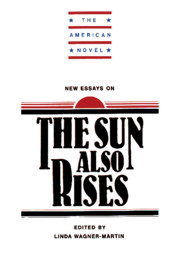Book contents
- Frontmatter
- Contents
- Series Editor's Preface
- 1 Introduction
- 2 Humor in The Sun Also Rises
- 3 The Sun in Its Time: Recovering the Historical Context
- 4 Brett Ashley as New Woman in The Sun Also Rises
- 5 Decoding the Hemingway Hero in The Sun Also Rises
- 6 Afterthoughts on the Twenties and The Sun Also Rises
- Notes on Contributors
- Selected Bibliography
6 - Afterthoughts on the Twenties and The Sun Also Rises
Published online by Cambridge University Press: 06 July 2010
- Frontmatter
- Contents
- Series Editor's Preface
- 1 Introduction
- 2 Humor in The Sun Also Rises
- 3 The Sun in Its Time: Recovering the Historical Context
- 4 Brett Ashley as New Woman in The Sun Also Rises
- 5 Decoding the Hemingway Hero in The Sun Also Rises
- 6 Afterthoughts on the Twenties and The Sun Also Rises
- Notes on Contributors
- Selected Bibliography
Summary
The publication in 1973 of Malcolm Cowley's A Second Flowering reopened once again a question most of us might have preferred to leave closed and may have assumed was long closed. Yet even today it continues to preoccupy us like the puzzle of some ancient unsolved crime, and the occasion of this essay may make it appropriate to explore some of its implications still further.
Just how important, really was the generation of writers who are commonly assumed to have produced a renascence of American literature in the twenties? What is the meaning and value of their contribution from the perspective of all that we know about them and all that has happened in our literature since their time?
Mr. Cowley, having spent more than fifty years studying these writers, may be forgiven if, at seventy-five, he was unable or unwilling to offer much more than a reiteration of opinions that over the years have grown habitual with him and have come to represent the official establishment answer to these questions. His understandably strong feelings of proprietorship toward the twenties writers have caused him to take it for granted that, in spite of individual shortcomings of which he is well aware, they were, on the whole, the most distinguished literary generation the century has so far produced – the most distinguished, in fact, since the great first flowering of American literary talent in the generation of Emerson and Thoreau. Mr. Cowley has written eloquently in support of his position, and one can scarcely fault him for taking it.
- Type
- Chapter
- Information
- New Essays on The Sun Also Rises , pp. 109 - 130Publisher: Cambridge University PressPrint publication year: 1987



